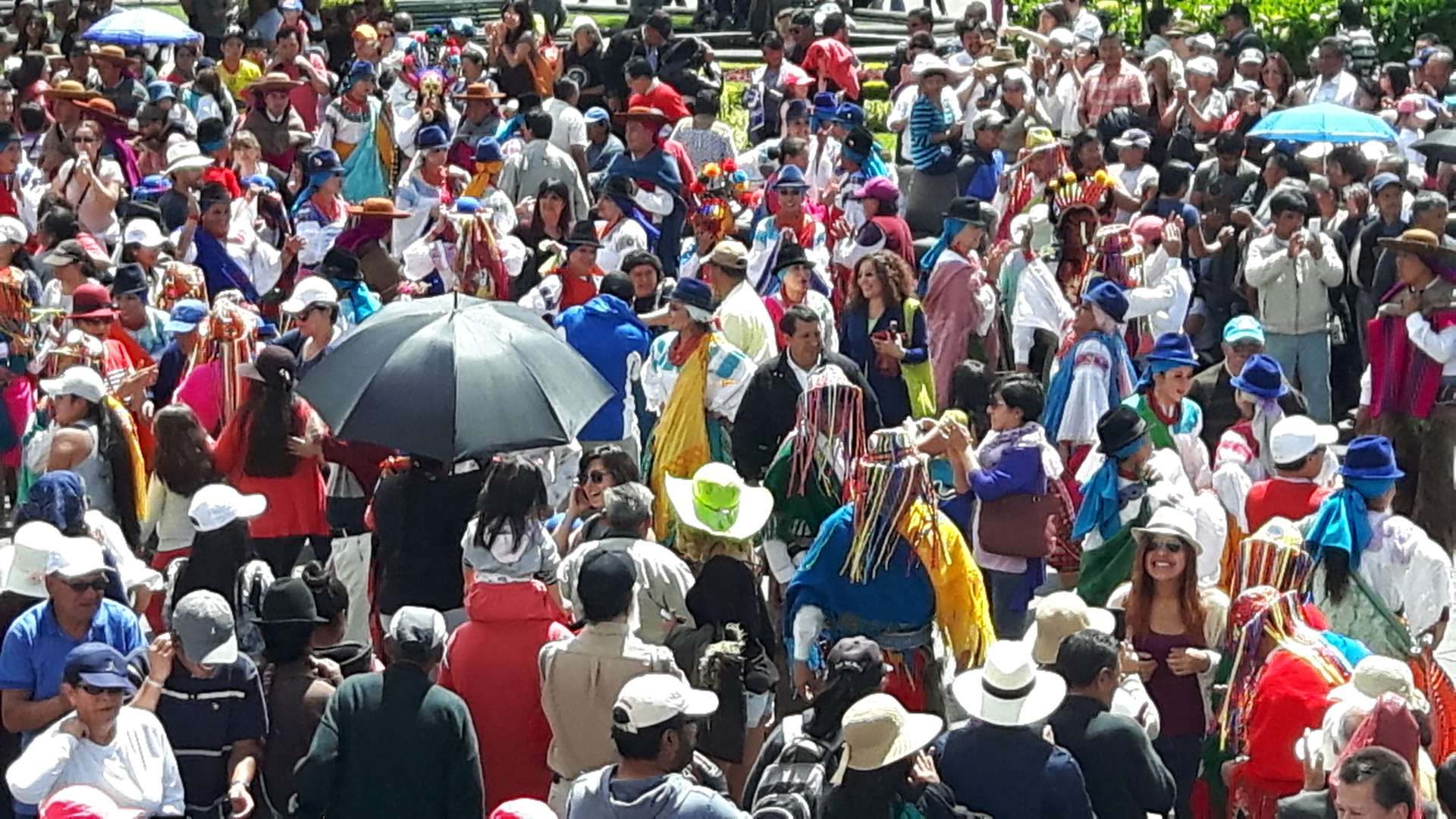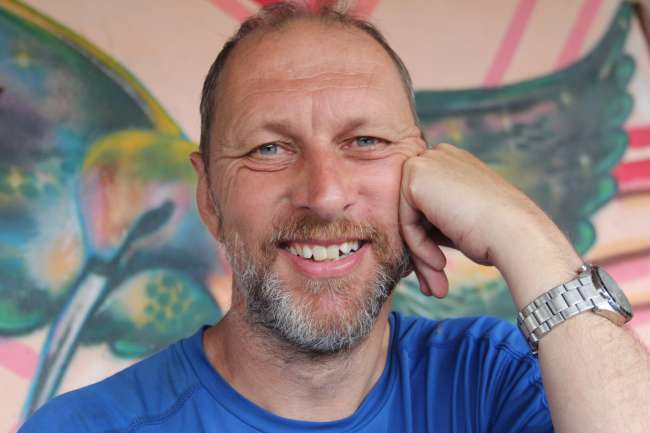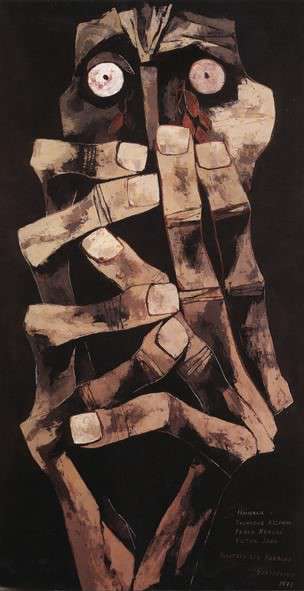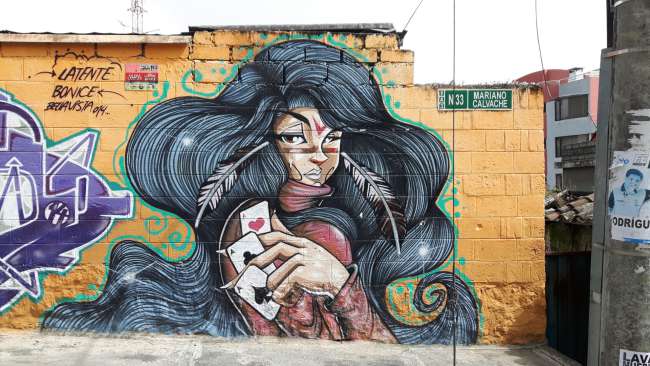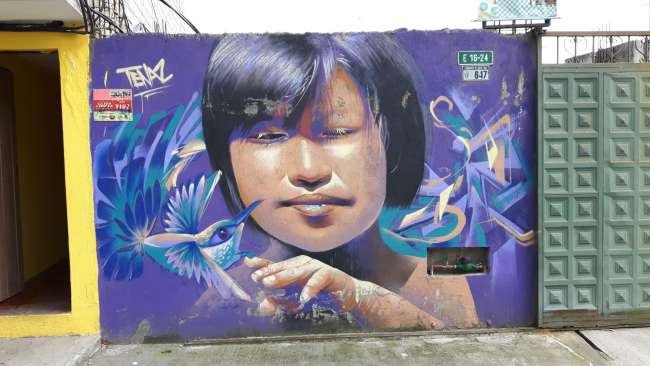Oswaldo Guayasamin
प्रकाशित: 07.05.2017
समाचार पत्रिका के लिए सदस्यता लें
You can google the name and find out more than what I write here. However, you cannot emotionally experience the fact that today I stood in front of his works, saw them, received explanations, and was deeply moved by his work.
Now, let's start from the beginning. Last week, a visit to Oswaldo Guayasamin's house was on the school program. Since I was the only one registered, I decided not to go. We would have gone by taxi with the school. Today, I went by myself, first walking to Parque Metropolitano to find my probably last cache in Ecuador. Then there is a path that leads directly to his house. So I went there alone and took a Spanish tour. There was also an English tour available, but why am I here, right?
I was pleased to realize that I understand quite well if it is somehow clear what it is about. Anyway, I understood 85% of it.
Since you probably haven't googled it yet, here's a brief explanation of Oswaldo Guayasamin. He was a painter. He was a socialist, a friend of Fidel Castro and other socialists. He impressively portrayed the pains of the oppressed, the tortured, the killed, mostly using dark colors. Scenes from various wars are visible (World War II, Spanish Civil War, Vietnam War) and he mainly targets racist, fascist dictatorships. In his paintings, he also repeatedly seeks the Latin American identity: the mixture of indigenous, Spanish, and African culture, from which the mestizo identity originated. He paints impressively in terms of expression, but also in terms of dimension. His largest painting in the exhibition is 6 by 12 meters and painted in acrylic.
Since photography was not allowed in the museum, I downloaded a picture from the internet and posted it here on the blog. The picture with the face in front of the fingers. Take a look yourself. The story behind it: In September 1973, Guayasamin's three best friends in Chile died within 12 days: Salvador Allende, Victor Jara, and Pablo Neruda. They were all victims of Pinochet's military coup. This painting is the expression of his experience. It deeply moved me at the museum: the painting, the representation of the situation, the emotional impact.
After the museum, I walked towards Parque Carolina. I hoped to find a small restaurant or a snack bar down there because I was hungry. On the way, I noticed two graffiti. I have already noticed that there are some very beautiful graffiti to be seen in Quito. Somehow, when looking at the two pictures, I recognized clues in them about the search for identity. Art is not only in the museum, no, it is also on the street.
After passing Avenida Eloy Alfaro, I was attracted to a Chinese restaurant. There were only Chinese people inside and they were speaking Chinese. Wonderful, then the food had to be good. I ordered a portion of spicy tofu with rice. I wanted to know if tofu can also taste good after the soy product I ate in the first week was rather bland. This time it was better, thanks to the sauce that brought my nasal mucosa to the limit of its endurance. And that with only one tissue paper in my pocket. The two paper napkins that were served to me also had to be used for that purpose. By the way, I prefer to walk through the city without a backpack. Wallet, cell phone, and GPS are the valuables that I usually carry with me. I put them in the zippered pockets of my lightweight jacket and the umbrella is in the back pocket. It can stick out. If someone wants to steal it, please go ahead. I have learned this much here in Quito: Do not go out without an umbrella! In the front pocket of my pants, there are coins and maybe a pathetic $5 bill. And of course, a tissue paper on the other side. If something larger needs to be carried, it is best to use one of those tiny plastic bags that you can get in any store with any purchase. It looks inconspicuous and local.
By the way, I didn't finish the food. It was simply too much, and above all, I mostly sorted out the chili peppers, otherwise I would have had to use the tablecloth to blow my nose.
After that, I walked through a part of Parque Carolina that I didn't know. Paradise for BMX riders, rollerbladers, and skateboarders. A huge, winding halfpipe. All in all, it is about 500 meters long. Next to it is a playground for children. And again, an incredible number of people. Fiesta in the park, family picnics, loud children's laughter and screaming, joy of life. Quickly collected a few Pokémon and then went home. Once again, before the rain.
And one more thing: Today I had a long conversation with Aline. Of course, we talked about school, how it's going, and what's going on. I won't go into detail about that, of course. Besides school, we also talked about the blog, whether the kids are allowed to read it. Of course! I am aware that theoretically the whole world could look into it. That's why I write in such a way that I don't offend anyone or say anything thoughtless (which happens to me occasionally when I speak!). I'm glad it's being read and if it's not interesting, then it doesn't bother me much. I also write to remember what happened in chronological order. This idea is connected to many more memories, and when I read it later, these memories will come back to me. So, welcome to my blog.
4th graders: If you saw pictures of my current room a few days ago, you probably missed that there is a white note in one of the pictures in this room. Do you know what it is? No, how would you know. It's your note with wishes for my time here in Ecuador. Yes, I hung it up.
समाचार पत्रिका के लिए सदस्यता लें
उत्तर
